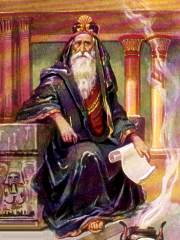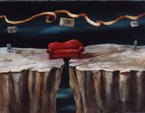 So last night, I was praying night prayer, or Compline, in my bedroom. (The link is to some short Celtic Complines from the Northumbria Community in England, but I also pray using various versions of the Anglican Book of Common Prayer as well as other prayer books, especially Celtic ones). This is an on-again, off-again habit I've had which I recently resumed following advice from my Discipleship Group leader, Carl. It's been a good thing in my life, so thanks, Carl.
So last night, I was praying night prayer, or Compline, in my bedroom. (The link is to some short Celtic Complines from the Northumbria Community in England, but I also pray using various versions of the Anglican Book of Common Prayer as well as other prayer books, especially Celtic ones). This is an on-again, off-again habit I've had which I recently resumed following advice from my Discipleship Group leader, Carl. It's been a good thing in my life, so thanks, Carl.Anyway, it was late at night, and Tina was already asleep, and I lit a stick of incense and a candle (as is my habit) and started to pray Compline. I want to talk a little more about the candle. I had one of those little glass candle holders that's made for a votive candle and is about the size of a small juice glass. It's green. I didn't have any votive candles, so what I put in it was what they call a "tea light", which is one of those little, short, round candles in a little metal cup, about the same diameter as a votive candle but less than an inch tall. I used a regular match from a matchbook to light it, and only after lighting the incense with the same match, so by the time I lit the candle, I came pretty close to burning my fingers. Accordingly, I dropped the match into the little candle glass, where it lit the wick of the tea light in a satisfactory manner.
If you're still reading, I'm surprised. Why in the name of all that's holy am I going into excruciating detail on the lighting of a candle? Well, I'll tell you why. Because somehow, that particular chain of events led to this: right in the middle of a period of silence, while I was trying to meditate, I heard a "Whoosh! Crackle, snap, pop!" I opened my eyes and looked up, and my little tea light candle flame had become a full-on pillar of fire. I'm not kidding. Flames were shooting up more then a foot above the top of the little green glass, then dancing left and right, then subsiding a bit, maybe even sinking below the lip of the glass, then, "Whoosh! Snap, crackle, pop!" and up we go again, twisting and dancing and reaching for the ceiling. This kept up for a good five or ten minutes! I sat there just enraptured at the beauty of it. Then a voice boomed, "I AM WHAT I AM!" No, now I'm kidding. :-)
It occurred to me to wonder whether the glass (which was sitting at eye-level) was going to explode and send shards of itself hurtling into my face, but I decided that to follow that line of thinking would be ungrateful. So I just sat there watching and listening and enjoying it until, several minutes later, it slowly subsided and died, the tea light completely used up.
Now, I don't assign any particular significance, spiritual or otherwise, to this event. But I must say it was pretty freakin' cool!!! And I'm grateful to have experienced it. So I'm going to light another tea light in the same little green glass and pray Compline again tonight before I go to sleep. If I see any winged beasts with four different faces, I'll let you know.



